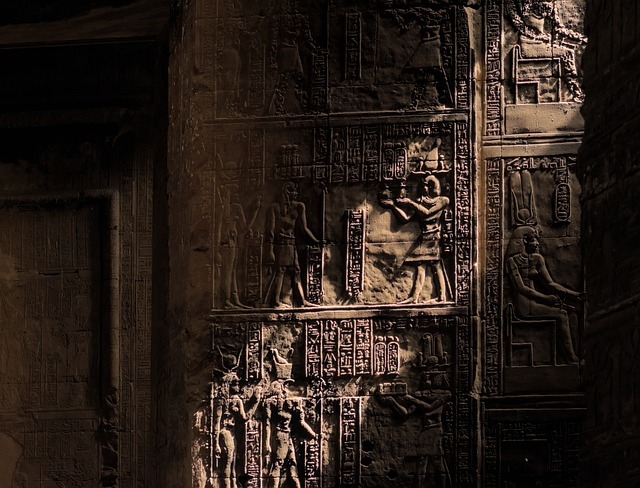Israel Antiquities Authority – Laboratories
This article is the second and final part of our study session about the Israel Antiquity Authority – See Article Here.
There are four main laboratories at Har Hotzvim, for the conservation and preservation of stone, glass and fabric, pottery and metal finds. At the archaeological site, it is crucial to identify each object, and the exact locus of each find is documented – for example, whether on the floor, in a jug, etc., and at what depth and so on. Each object has an identity card plus a drawing or photograph.
Pottery is the dominant material of excavations. In the lab it is washed, spread on a table and marked with the season, site and exact location, and license number. They are then put together as far as possible, and finally the gaps are filled in with plaster of Paris which is strengthened and coloured to maintain visual coherence. An object which is considered to be complete and restored is not necessarily totally complete. Most (99%) vessels are symmetrical, so as long as one full side is constructed, it is considered complete. (It is fully reconstructed by the artist who draws the object).
There are different categories of objects:
Pitos – the largest; Amphora – with two handles, tapering, used for wine or oil; Jars – with two handles; Cooking pots – round and heat resistant; Jugs – with one handle , for dipping; Amphoriscus – small container for dipping; Large bowls, bottles, lids, plates and lamps.
Metal is preserved to continue studying. Solutions for cleaning are used according to corrosion. After cleaning, the object is put into sterilized water to neutralize it to prevent further deterioration. As far as possible, the method used is mechanical (hand) under magnifying glass.
Each object is also photographed or drawn to scale.
APPENDIX
Antiquities Law (http://www.amnumsoc.org/inc/israel.htm)
Excavation, ownership and dealing in antiquities is strictly regulated in Israel.
The Israel Antiquities Authority has a legal mandate from the State to protect Israel’s archeological heritage. Therefore, as soon as a construction company uncovers archeological remains it must contact the Antiquities Authority so the site can be excavated. Only after all excavation has been completed and the necessary artifacts removed from the site can construction continue. Religious issues arise when ancient graves are discovered in a site. According to Halacha (Jewish law), respect for the dead is of the utmost importance, and hence graves are not to be disturbed. Israel is a minefield of archeological remains, and severe archeological and economic problems are created by the obstacles to construction arising from strict application of Halacha. Despite claims by the Ultra-Orthodox that construction can occur over graves (if their presence is not known) or around them, it is nearly impossible to build any roads, buildings, or tunnels without the relocation of gravesites.
The following is an extract from the Antiquities Law of the State of Israel (1978) which replaced British Mandatory Antiquities Ordinances.
Definitions
Antiquity: any object, whether detached or fixed, which was made by man before the year 1700 of the general era, and includes anything subsequently added thereto which forms an integral part thereof. “Excavation” or “digging” includes a search for antiquities and a trial digging.
State Ownership of Antiquities
Where an antiquity is discovered or found in Israel after the coming into force of this Law, it … become(s) the property of the State. A person who discovers or finds and antiquity … shall notify the Director [of the Israel Antiquities Authority] within fifteen days of the discovery or find. [If he] alleges that any antiquity was discovered or found before the coming into force of this Law shall bear the onus of proof.
The Director may waive State ownership of an antiquity in writing, and upon doing so the antiquity shall cease to be the property of the State.
Excavations
No Person shall dig on any land, or otherwise search, for antiquities, including the use of a metal detector, or gather antiquities, unless he has obtained a license to do so from the Director…
If a person is found on an antiquity site with digging implements in his possession or nearby with which it must be supposed digging has recently been done on that site or is found with a metal detector in his possession or nearby, he shall, unless he proves otherwise, be presumed to have intended to discover antiquities.
Dealing in and Export of Antiquities
A person may only deal in antiquities if he is in possession of a license therefor from the Director and in accordance with the conditions of the license… [The license] shall indicate the place of business … and shall be displayed there in a conspicuous position.
Where a dealer in antiquities offers any article for sale as an antiquity, his plea that he did not know that the article was not an antiquity shall not be heard. A person shall not sell or display for sale a replica or imitation of an antiquity without indication thereon, in the manner prescribed by regulations, that it is not a genuine antiquity.
A person who contravenes [this section] is liable to imprisonment for a term of two years or a fine of 100,000 pounds.
A person shall not take out of Israel an antiquity of national value save with the written approval of the Minister [of Education and Culture]. A person shall not take out of Israel any other antiquity save with the written approval of the Director. A person who contravenes [this section] is liable to imprisonment for a term of six months or a fine of 30,000 pounds.
A Personal Summary
Many of an older generation are familiar with the fictional hero of Indiana Jones. He was hunting for biblical treasure in Raiders of the Lost Ark, whereby his character was involved in an exciting conflict with Nazis seeking to gain extra terrestrial power from the Ark of the Covenant. Aside from these adventures, his character also took on the form of an archaeological professor, a somewhat meek one running counter to his alter ego out in the field. However, the real adventure for many serious archaeological scholars begins at the preliminary research stage, gaining palpable support for deciding to undertake an actual excavation. Accordingly, the IAA can be the starting point for many a real life adventure that has uncovered genuine discoveries, which otherwise would have remained unearthed. It is with such thoughts in mind that we can better understand how our visit to this facility was also a trigger for personal research and quests into uncovering our own heritage. The Trail of the Ark is a Jewish TV Channel special series that was sported after a visit to the Israel Antiquities Authority!
Further episodes of this diary will be featured in later issues of the Jewish TV Channel through its Jewish Travel Channel.
Do you fancy taking a trip to Israel and maybe becoming a tour leader of your own group? The benefits are enormous and can include many free travel opportunities. A special course will be operated by qualified and experienced JTVC staff to enable you to learn more about such subjects as the history of Israel, its diverse people, its geological composition, and much more besides. Feel free to get in touch with us for further details.
CONTACT JTVC



 The 18 November field trip consisted of visits to the Israel Lands Authority in the morning and the Bible Lands Museum Jerusalem in the afternoon.
The 18 November field trip consisted of visits to the Israel Lands Authority in the morning and the Bible Lands Museum Jerusalem in the afternoon.










